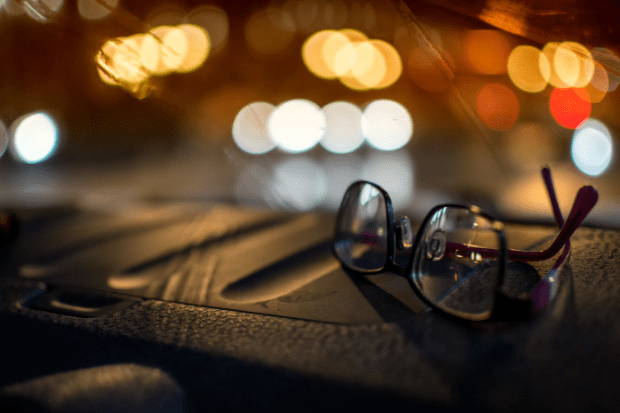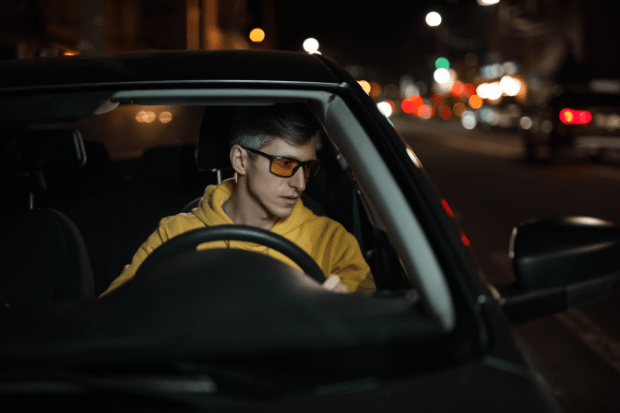How to Improve Night Vision

Difficulty driving at night is one of the most common reasons patients visit their eye doctor. Most of us find driving at night to be somewhat difficult, but some may suffer from a debilitating condition called nyctalopia or night blindness. Night vision can be improved with lifestyle changes, investing in sunglasses or night driving glasses, and resting your eyes during digital device use.
Night Blindness: What it is, What are the Reasons
Night blindness is the inability to see in dark or dim light. Nyctalopia happens because of the eye's inability to adapt quickly from lightness to darkness, typically due to a dysfunction in the rod cells of the retina. Several eye diseases can cause night blindness, including cataracts, near-sightedness/myopia, Retinitis Pigmentosa, Usher syndrome, and Vitamin A Deficiency.
Consult with Optometrist First
Prior to starting any type of treatment, you should see your eye doctor. Your doctor will conduct a comprehensive examination and diagnose any eye condition or disease that could make it difficult to drive at night. They will often have additional suggestions on how to improve night driving vision.
Ways to Improve Night Vision

There are several lifestyle changes you can make to improve your night vision including eating a healthy diet, routinely exercising, and avoiding smoking.
Eat a Healthy Diet
Eating healthy and getting enough of the essential vitamins is important for clear vision. Vitamin A improves the ocular surface and is required for the formation of rhodopsin in the retina. This photopigment is found in the rod cells of the retina and allows our eyes to see at night. Beta carotene is the primary source of Vitamin A. Foods rich in Vitamin A include: dark green leafy vegetables, carrots, sweet potato, tomatoes, red pepper, pumpkin, and squash.
Vitamins B, C, and E are also key vitamins for overall eye health. Vitamin E has antioxidant properties to fight free radicals in the body, possibly lowering the chance of cataract development. Vitamin C protects against UV damage which is known to cause cataracts and macular degeneration. A lack of Vitamin B may play a role in the development of glaucoma.
If adequate vitamins like Lutein, Zeaxanthin, zinc and omega-3 fatty acids are not acquired from your diet, supplementation may be needed.
Treat Dry Eye
Dry eye is a very common condition of the ocular surface. Dry eye can be caused by reduced tear production and/or increased tear evaporation. Dry eye is more common in females, patients with systemic diseases like Sjogrens or sleep apnea, and with the use of certain medications. Environmental factors like dry climates or digital device use can exacerbate dry eyes. If you have dry eyes, driving at night can be more difficult. When the eye is dry, incoming light becomes unfocused and scattered resulting in more glare and halo.
Get Exercise Every Day
Recent studies demonstrate that exercise is not only good for your body, but your eyes. Exercise may reduce the risk of developing the most severe type of macular degeneration, wet ARMD. Aerobic exercise was found to also decrease your risk of glaucoma and diabetic retinopathy by improving the eye's resilience and protecting against new, unhealthy, blood vessel growth.
Wear Sunglasses during the Day
Wearing sunglasses during the day protects your eyes from UV damage from the sun. UV exposure over your lifetime increases your risk of developing cataracts. Cataracts can cause significant halos, glare and drastically affect your night vision. Your exposure to UV light accumulates over your lifetime contributing to the growth of cataracts with age.
Keep your Glasses and Windows Clean
Glare from dirty glasses or dirty windows can make it very difficult to drive at night. Keeping your glasses and windows clean can improve your vision at night because dirt or build-up on the glass may cause light to scatter and make glare from car or street lights worse.
Rest your Eyes
Eye fatigue from digital device use throughout the day can affect your night vision. Take frequent breaks from your computer and let your eyes focus at the distance. Optometrists recommend the 20-20-20 rule which says for every 20 minutes of screen time, you should look at something 20 feet away for at least 20 seconds. In addition, getting a good night of sleep is vital for overall eye and body health.
Take Supplements
If you do not get the recommended amount of vitamins from your diet, adding supplements may be needed to improve your night vision. Speak with your doctor to ensure supplementation is okay with your existing medications. Macuhealth is a newer supplement on the market that contains all three macular carotenoids: Lutein, Meso-Zeaxanthin and Zeaxanthin in the same 10:10:2 ratio that makes up the macular pigment of the eye. MacuHealth improves and maximizes macular pigment resulting in enhanced visual performance. Studies show the supplement is effective at improving night driving vision.
Avoid Smoking
Smoking affects several parts of the eye including the retina, lens and macula. These three parts of the eye are key for vision clarity. Smoking results in cloudy vision and/or peripheral and central vision loss. Smoking is one of the most significant risk factors for the development of macular degeneration.
Avoid Direct Eye Contact with Light Sources
When driving at night, try to avoid looking directly at sources of light. Staring directly into the beams can result in a temporary glare called disability glare. Disability glare is the loss of retinal image contrast as a result of intraocular light scatter, or straylight. In other words, your night vision is reduced by light elsewhere in the field of vision.
Choose Night Driving Glasses
Many patients may benefit from a pair of glasses for night driving. Night myopia is a condition where you may become nearsighted or myopic in low-light conditions. When the pupils dilate, more prescription, also called refractive error, becomes noticeable. Night driving glasses can reduce the glare from oncoming traffic and street lights. You can order night driving glasses with an anti-reflective coating at Overnight Glasses.
Conclusion
While most of us have some difficulty driving at night due to glare and halo from car and street lights, you should first see your optometrist for a comprehensive eye exam to rule out any eye problems or eye diseases. After examining your eyes, they may have some recommendations or treatments on how to improve night vision.
